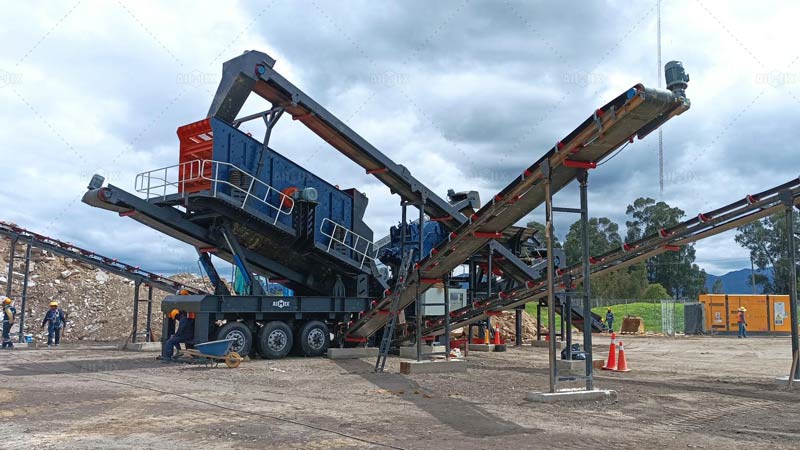Which Parts of a Stone Crushing Plant Need Lubrication?
In the mining and aggregate industry, the efficiency and longevity of crushing equipment are closely tied to proper maintenance practices. Among these, lubrication plays a vital role in reducing wear, preventing breakdowns, and ensuring continuous, safe operation. Whether it's a stationary stone crusher plant or a mobile crawler type stone crusher, knowing which parts require regular lubrication is essential for plant operators and maintenance teams.
Before we dive into the specific components, it's important to understand why lubrication is critical. A well-lubricated machine minimizes metal-to-metal contact, dissipates heat, reduces friction, and protects parts from corrosion. Without it, the intense mechanical action of crushing and conveying stone could rapidly lead to equipment failure.
Key Areas That Require Lubrication in a Stone Crushing Plant
1. Jaw Crusher Bearings
In most stone crusher plants(planta trituradora de piedra en venta), the jaw crusher is often the primary machine that handles the largest and hardest stones. The bearings of the jaw crusher endure heavy loads and vibrations during operation, making regular lubrication absolutely crucial.
Typically, these bearings are greased through automatic or manual systems. Neglecting lubrication can lead to overheating, increased friction, and premature bearing failure.

2. Cone Crusher and Impact Crusher Bearings
When a gravel crusher or cone crusher is part of the plant, it also includes several rotating shafts and bearings that require consistent lubrication. These crushers operate under high speed and pressure, and their internal components—such as eccentric bushings and main shafts—must stay well-lubricated to avoid scoring or metal fatigue.
In the case of impact crushers, the bearings that support the rotor are particularly sensitive to dust and high-speed impacts, so a high-quality lubricant and regular schedule are essential.
3. Gearboxes and Reduction Units
Conveyors, screens, and feeders in a stone crusher plant rely on gearboxes to transmit power efficiently. These gearboxes operate under load and sometimes harsh environmental conditions. Keeping them filled with the correct type of lubricant helps reduce wear and protect against dust ingress.
Routine oil checks and replacement schedules ensure that gear mechanisms stay in top condition, maintaining productivity across the plant.
4. Conveyor Rollers and Idlers
Conveyor systems are the lifeline of any crushing plant, responsible for transporting crushed material from one stage to the next. The rollers and idlers supporting the conveyor belt rotate continuously, and their bearings need regular lubrication to ensure smooth and energy-efficient operation.
For remote or outdoor installations like a crawler type stone crusher(trituradora sobre orugas), sealed bearing systems may be preferred to minimize dust contamination, but even sealed components benefit from periodic inspection.
5. Screen Vibrators and Bearings
Vibrating screens used to classify materials according to size feature motors and shafts that vibrate at high frequencies. The bearings and moving parts of these systems undergo constant stress and need proper lubrication to avoid overheating and ensure stable performance.
Failing to lubricate screen motors properly can lead to misalignment, noise, or even motor failure—causing delays in material processing.
6. Hydraulic Cylinders and Pumps
Modern crushing plants often incorporate hydraulic systems, especially in mobile units like crawler type stone crushers, where automation is common. Lubricating hydraulic cylinders and pumps ensures they function smoothly without jerks or leaks.
Clean hydraulic oil, free from contaminants and topped up to the right levels, helps protect seals and moving components within these high-pressure systems.
7. Drive Chains and Pulleys
Drive chains and pulley mechanisms, often used in feeder systems or small crushers, require oil or grease to prevent rusting and premature stretching. Regular cleaning and lubrication extend their service life and reduce the risk of failure under load.
Best Practices for Lubricating a Crushing Plant
Use the Right Lubricant
Each component has specific lubrication requirements. For example, high-speed bearings may need synthetic grease, while heavy-load gearboxes may need high-viscosity oil. Refer to manufacturer specifications for proper product selection.
Set a Lubrication Schedule
A preventive maintenance schedule helps avoid unexpected downtime. Lubrication should be done daily, weekly, or monthly depending on equipment type and working conditions.
Automate Where Possible
Larger or high-capacity stone crusher plants benefit from automated lubrication systems that deliver grease at set intervals. These systems help maintain consistency and reduce labor costs.
Conclusion
Lubrication is a non-negotiable part of maintaining a high-performance crushing operation. From primary jaw crushers to secondary machines like gravel crushers(trituradora de piedra para grava), every moving part needs attention. For those operating mobile setups like a crawler type stone crusher, the harsh environment demands even more vigilant lubrication routines.
Regular maintenance, coupled with proper lubrication, can significantly improve equipment life, reduce repair costs, and ensure consistent material output in any stone crusher plant. For plant owners looking to maximize uptime and productivity, focusing on lubrication is one of the smartest investments you can make.
